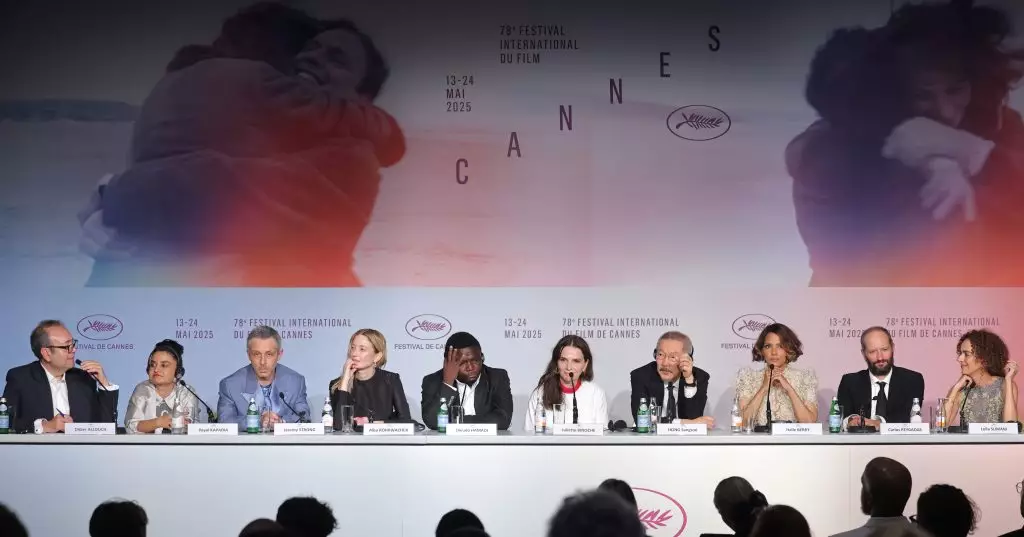In an unexpected twist that electrified the Cannes Film Festival, Jafar Panahi’s latest work, *It Was Just an Accident*, seized the prestigious Palme d’Or. Jury President Juliette Binoche articulated the film’s significance, describing it as a representation of resistance and survival—qualities that resonate deeply in today’s turbulent world. This development not only highlights Panahi’s artistic genius but also solidifies his status as a beacon of hope for those languishing under oppressive regimes.
Panahi, known for his steadfast refusal to conform to the restrictions imposed by the Iranian government, has faced serious repercussions for his art, including two unjustified imprisonments. His works often delve into the challenges and injustices within Iran, serving as a poignant reminder of the price of dissent. Binoche noted that the ability to draw such human and political nuances in his film is what made it stand out during competition. In a festival renowned for elevating cinematic artistry, Panahi’s film transcended entertainment; it became a clarion call for the recognition of human rights and dignity.
Exploring the Human Condition through Film
*It Was Just an Accident* chronicles the lives of working-class individuals seeking retribution against authorities who have wronged them. Binoche highlighted a transformative aspect of the story—its interrogation of revenge as a human response. Instead of perpetuating the cycle of violence that often dominates narratives surrounding hardship, Panahi presents the possibility of dialogue and understanding. This shift offers a striking optimism that resonates in a world frequently overshadowed by retaliation and brutality.
The film’s message is particularly relevant in light of Binoche’s assertion that artists, whether actors, writers, or directors, have a responsibility to confront societal malaise. The idea that art can not only comment on but also instigate real-world change is a powerful one, and Panahi embodies this ethos. He refuses to allow his experience of violence to fester as a catalyst for further violence, instead opting to cultivate a discourse rooted in empathy.
The Role of Art in Reimagining Societal Norms
At a press conference, the jury’s deliberative process was likened to a “conclave with champagne” by Oscar nominee Strong, who highlighted the philosophical underpinnings guiding their choices. In bestowing the Palme d’Or upon Panahi’s film, the jury aimed to celebrate not only its artistic merit but also its broader societal implications. Strong, joined by a cadre of esteemed jurors, underscored the importance of selecting works that resonate on multiple levels, including emotional depth and cultural commentary.
The jury’s decisions reflect a larger artistic paradigm shift, championing the notion that film can serve as a vehicle for thought-provoking discourse. The deliberations unfolded against a backdrop of global tension, with themes of resistance and hope manifesting in the jurors’ selections. Binoche’s remarks about the necessity of changing perspectives on violence compel both artists and viewers alike to engage with these challenging subjects critically—the essence of what’s at stake in our humanity.
A Call to Action
The impassioned discussions surrounding Panahi’s film evoke a sense of urgency. As the jury members explored the pieces presented to them, it became apparent that they were not only arbiters of cinematic excellence but also advocates for meaningful change. Their choices symbolize a collective stance against the encroachment of authoritarianism, highlighting the power of storytelling to inspire empathy and understanding.
The dialogue that Panahi initiates through his latest work is essential, especially in times when art is often relegated to mere escapism. He reaffirms that in confronting the darker aspects of human nature, we can seek pathways toward transformation and healing. As Binoche poignantly states, without a commitment to better treatment of each other, our claim to humanity falters. The challenge now lies in translating the sentiments beautifully captured in *It Was Just an Accident* into actionable change within society itself—a mission as monumental as the artistry involved in creating it.
